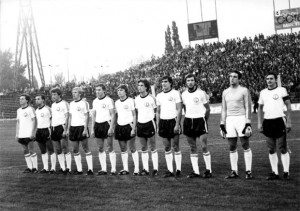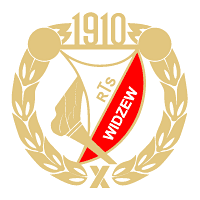Poland – 19th in Europe. The previous season the country had its weakest ever champion, so any winner would have been better after that, theoretically. Objectively, Polish clubs were traditionally made in such a way, so not really strong was able to emerge: they were fairly equal and momentary form more or less ruled. On top of everything, the country entered a bitter decade of social unrest, demanding political and economic changes – no doubt, football was also affected. But no matter, the game was played and no championship was interrupted.
The Second Division had familiar winners: in Group 1 Piast (Gliwice) and Pogon (Szczecin) competed for the first place.
 Pogon won with 41 points. High scoring was their trade mark this season.
Pogon won with 41 points. High scoring was their trade mark this season.
Group 2 was a bit more competitive, but here too a duel formed – between Huthink (Krakow) and Gwardia (Warszawa).
 With 42 points Gwardia clinched victory by a point, strongly depending on their excellent defense.
With 42 points Gwardia clinched victory by a point, strongly depending on their excellent defense.
The newly promoted teams were very familiar with top league football – they were just returning to 1st Division football.
The First Division offered its usual tough battle between similar teams, which at the end made for unpredictable championship – at least on the top of the league. At the bottom Odra (Opole) was hopeless outsiders, finishing 16th with measly 18 points. Three teams fought for escaping the other relegation place – Zawisza (Bydgoszcz) lost the race and ended 15th with 23 points.
Up the table three clubs were noticeably in crisis: Ruch (Chorzow) – 7th, Stal (Mielec) – 9th, and Gornik (Zabrze) – 12th. The leading clubs of the 1970s were down now.
 Gornik’s photo is quite a strong example of typical Polish troubles: it was made just before the start of the ‘good-bye’ match of Jerzy Gorgon – in Switzerland against Sankt Gallen, just after he was sold to the Swiss club. With Gorgon gone, Gornik became just as the most Polish teams – with one or none star in the squad.
Gornik’s photo is quite a strong example of typical Polish troubles: it was made just before the start of the ‘good-bye’ match of Jerzy Gorgon – in Switzerland against Sankt Gallen, just after he was sold to the Swiss club. With Gorgon gone, Gornik became just as the most Polish teams – with one or none star in the squad.
 Motor (Lublin) – a typical example of most Polish teams. They finished 10th this year – former leaders, like Gornik, were just like Motor by now.
Motor (Lublin) – a typical example of most Polish teams. They finished 10th this year – former leaders, like Gornik, were just like Motor by now.
And may be because of that there was fierce competition for the title – between 6 clubs, which left the rest far behind. Four of them finished with equal points – 36 each. Head-to-head results, not goal-difference, decided positions in such occasions, so Baltyk (Gdynia) took the 6th place – 6 points ahead of Ruch, 7th. Yet, Baltyk was more similar to Motor than to other favourites. But none was really outstanding as a team, so momentary form was the prime factor.
Legia (Warszawa) ended 5th.
 From left to right: Mirosław Okoński, Janusz Baran, Waldemar Tumiński, Ryszard Milewski, Krzysztof Adamczyk, Henryk Miłoszewicz, Marek Kusto, Paweł Janas, Stefan Majewski, Jacek Kazimierski, Adam Topolski.
From left to right: Mirosław Okoński, Janusz Baran, Waldemar Tumiński, Ryszard Milewski, Krzysztof Adamczyk, Henryk Miłoszewicz, Marek Kusto, Paweł Janas, Stefan Majewski, Jacek Kazimierski, Adam Topolski.
Compared to Gornik – a strong squad… some well established stars, some up and coming, some very promising. Kusto, Okonski, Janas, Majewski should have been able to make the difference even without further help – but they were 5th at the ned.
 Slask (Wroclaw), similar to Legia and mo long ago looking very promising, finished 4th.
Slask (Wroclaw), similar to Legia and mo long ago looking very promising, finished 4th.
 Szombierki (Bytom), the surprise champions of the previous year, finished 3rd – well, bronze after gold suggests a strong team. Szombierki was not and running on enthusiasm went only that far – to come, however minimally, ahead of Legia, Slask, and Baltyk.
Szombierki (Bytom), the surprise champions of the previous year, finished 3rd – well, bronze after gold suggests a strong team. Szombierki was not and running on enthusiasm went only that far – to come, however minimally, ahead of Legia, Slask, and Baltyk.
Wysla (Krakow), arguably the most consistent team at the time, finished 2nd with 37 points.
 First row from left: K. Gazda, L. Lipka, A. Iwan, A. Nawałka, K. Kmiecik, J. Krupiński, J. Jałocha, A. Targosz, H. Szymanowski.
First row from left: K. Gazda, L. Lipka, A. Iwan, A. Nawałka, K. Kmiecik, J. Krupiński, J. Jałocha, A. Targosz, H. Szymanowski.
Middle row: Z. Szczotka (masseur), L. Franczak (assistant coach), K. Budka, P. Skrobowski, M. Motyka, J. Adamczyk, R. Gaszyński, S. Gonet (coach), M. Holocher, Z. Płaszewski, M. Wróbel, J. Kowalik, Z. Kapka, W. Lendzion (assistant coach).
Looking at the names, this should have been the number one team – and they came close, but lost the title by a point. So, it was not truly superior squad… measly 1 one point ahead of Szombierki.
Two points better than Wisla finished a club so far winning nothing.
 Widzew (Lodz) won their very trophy ever with 39 points – 14 wins, 11 ties, 5 losses, 39-25 goal-difference. Today is easy to say they ‘but of course, they had Boniek’. True, they had him and he was may be the biggest star in Poland at the moment, but he was not yet the world-class star – not until 1982. Widzew depended on tough defense – they had the best defensive record this season in the league, but their striker power was weak – 5 clubs, including 11th placed Arka (Gdynia) outscored the champions. Widzew simly squirreled points, careful not to lose matches, and at the end of the championship they were rather lucky to finish ahead of the pack of 6 fairly unexceptional rivals. But win they did and it was fantastic occasion.
Widzew (Lodz) won their very trophy ever with 39 points – 14 wins, 11 ties, 5 losses, 39-25 goal-difference. Today is easy to say they ‘but of course, they had Boniek’. True, they had him and he was may be the biggest star in Poland at the moment, but he was not yet the world-class star – not until 1982. Widzew depended on tough defense – they had the best defensive record this season in the league, but their striker power was weak – 5 clubs, including 11th placed Arka (Gdynia) outscored the champions. Widzew simly squirreled points, careful not to lose matches, and at the end of the championship they were rather lucky to finish ahead of the pack of 6 fairly unexceptional rivals. But win they did and it was fantastic occasion.
 Widzew (Lodz) was found in 1910, although there is a bit of uncertainly – some sources give 1922 as their first year, which could be the year of making a football team and 1910 referring to the foundation of all-sports club. So far, Widzew had humble existence – not only they never won anything, but they were somewhat trailing in the shadow of their local rivals LKS (Lodz). But after 1975 things eventually changed: LKS, famed for Jan Tomaszewski, was fading, Widzew, having the rapidly climbing up to stardom youngster Boniek, moved also up. But Boniek was just one player, surrounded by rather insignificant teammates. And the new champions were still insignificant squad, except they got two important additions in the summer of 1980: the well remembered abroad Wladislaw Zmuda, perhaps the top central-defender at the moment, arrived from Slask (Wroclaw) and already included in the Polish national team talented goalkeeper Jozef Mlynarczyk came from Odra (Opole). Suddenly Widzew came at par with the typical strong Polish teams: a few stars made the difference and Widzew’s as well dispersed group – Mlynarczyk between the goal-pots, Zmuda in front, commanding the defense, Zbigniew Boniek in midfield, and bright young talent, soon to be a major star – Wlodzimierz Smolarek in attack. The skeleton was strong enough to compete with similar teams and eventually won the league. Apparently, 4 strong players were enough – first-time winners usually become legendary teams for their fans and are remembered forever: it is hardly the case with this team – the stars are remembered, but not the whole team. Well, it was great, locally, and Widzew got the edge from LKS – they also won one Polish championship, but long time ago, so currently Widzew was on top. Good, but only the next season could tell if they were not only one-time wonder.
Widzew (Lodz) was found in 1910, although there is a bit of uncertainly – some sources give 1922 as their first year, which could be the year of making a football team and 1910 referring to the foundation of all-sports club. So far, Widzew had humble existence – not only they never won anything, but they were somewhat trailing in the shadow of their local rivals LKS (Lodz). But after 1975 things eventually changed: LKS, famed for Jan Tomaszewski, was fading, Widzew, having the rapidly climbing up to stardom youngster Boniek, moved also up. But Boniek was just one player, surrounded by rather insignificant teammates. And the new champions were still insignificant squad, except they got two important additions in the summer of 1980: the well remembered abroad Wladislaw Zmuda, perhaps the top central-defender at the moment, arrived from Slask (Wroclaw) and already included in the Polish national team talented goalkeeper Jozef Mlynarczyk came from Odra (Opole). Suddenly Widzew came at par with the typical strong Polish teams: a few stars made the difference and Widzew’s as well dispersed group – Mlynarczyk between the goal-pots, Zmuda in front, commanding the defense, Zbigniew Boniek in midfield, and bright young talent, soon to be a major star – Wlodzimierz Smolarek in attack. The skeleton was strong enough to compete with similar teams and eventually won the league. Apparently, 4 strong players were enough – first-time winners usually become legendary teams for their fans and are remembered forever: it is hardly the case with this team – the stars are remembered, but not the whole team. Well, it was great, locally, and Widzew got the edge from LKS – they also won one Polish championship, but long time ago, so currently Widzew was on top. Good, but only the next season could tell if they were not only one-time wonder.
